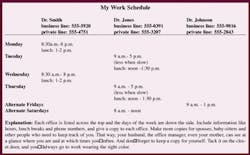When its a mauve day
Part-time work in multiple offices can add a little variety to the routine.
Cathy Hester Seckman, RDH
Do you ever feel left out of the mainstream of American workers? When everyone else is working their 40 hours a week, going to the same place day after day and looking at the same four walls, do you ever feel guilty? You, with your three part-time jobs and your whenever-I-want-one vacation schedule?
Well, you`re not alone. There are thousands of other part-time hygienists out there, going to this office on Monday, that one on Tuesdays and Thursdays, and still another one on Fridays. Sometimes you might wonder whether it`s a good idea to bounce around so much. When you wake up in the morning, maybe you lie there in bed, unable to decide whether it`s a mauve day or a Caribbean-blue one; and think how silly it is to try to juggle your professional life like this.
But it isn`t silly, and it might be a very good idea. Practice management consultants favor the idea of part-time hygienists, for a number of reasons. Peggy Sprague is a hygienist who, with her partner, Jan Lazarus, owns JP Consultants Institute in Los Angeles.
"If you can handle some of the obstacles," Sprague says, "working in different offices can be a good thing. Being able to work in different environments allows you to stay fresher, and not get in so much of a routine."
Variety, agrees Risa Pollack-Simon of Teamwork Concepts in Belmont, Calif., can be the best reason for choosing multiple part-time jobs. "Hygienists can add more variety to their professional lives, especially if they`re not excited about one office. You get different types of information, and you`re learning a little bit more."
Wally Gardner, a human resources manager who owns DenTemp in Memphis, believes that working in different offices can relieve not only boredom, but stress. "You get a change of scenery, so that if you do have an interoffice conflict, you won`t be back for two or three days, or maybe a week. Things can cool off."
Another benefit, Gardner feels, is actually job security. "A part-time hygienist with multiple jobs has a little more flexibility in the sense that if something happened to one position, be it the building burned down, the guy went bankrupt, whatever, she wouldn`t be out of a job entirely."
And employers have their reasons for liking multiple part-time hygienists, as well. "Of course it`s economic," Gardner says. "When you`re considered part-time at each office, no one has to give you benefits. But from a strictly economic standpoint, I don`t see that many advantages - the main advantage is more efficiency."
If a dentist has three part-timers already on staff, for example, then he is not left in a complete vacuum should one hygienist leave. The hygiene department still can function, and patients still can be seen. Vacations can be handled better among several hygienists. It allows easier expansion, also. At least one hygienist might be able to take on increased hours, when necessary, with little fuss or trouble.
On a larger scale, the small-business community nationally has seen an increase in part-time workers. Doris Davis is director of the Small Business Development Center, a partnership between the Small Business Administration, the Ohio Department of Development and Kent State University. Davis sees the trend towards part-time work in all kinds of small businesses.
"Many offices have an overflow of work, but they don`t really need to hire someone full-time for that, so flex-time and part-time work are very important in today`s society," Davis says. "It can be good for both employer and employee. We even see job-sharing with teachers now, where one teacher will work two days a week, and another will work three.
"With as many working women as we have now, flexibility is important. It makes the employees happy, and that results in higher production for the employer. A boss might have an employee in place for 40 hours, but it`s not quality work if the person isn`t happy. In contrast, a happy part-timer who produces quality work would be good for the company."
Obstacles for the Part-Timer
But what about those obstacles Sprague mentions? The obvious obstacle would be how to keep it all straight. Is it a Caribbean-blue day or not? Does this assistant expect me to start the autoclave before lunch? Or is that at the other office? Wait a minute! My next patient hasn`t had X-rays for 17 months. What`s the schedule here, again? And does this dentist want me to recommend Listerine or Viadent?
You need a good memory, but sometimes it doesn`t pay to trust it. Most part-timers admit to at least one morning when they drove halfway to the wrong office before the light dawned. Not to worry, there are strategies to help you out. Write everything down, the experts say. Pollack-Simon suggests cue cards that you might keep in a drawer at each office. "Refer to them every morning. Call them your reference cards, organize them by topic, and consider it a challenge."
Gardner, whose wife is a hygienist in three offices, says the family almost lives and dies by her day-planner. "I don`t know if she has a harder time keeping it straight or I do," he laughs. "She lives by that planner, and knows exactly what she has to do every day. She usually reviews it the night before."
Sprague says many hygienists handle multiple workplaces with ease. "It all depends on how organized you are. You must always know where you are and where you are going. Monday I`m maroon, for instance, and Wednesday I`m green. Monday I`m responsible for these protocols, and Wednesday for those. I would keep a log or a checklist. It`s very pertinent to review that regularly."
A second obstacle multiple part-timers face is with fitting into the dental team.
"So many times," says consultant Linda Miles, "whether you`re a hygienist or an assistant, if someone works part-time, other staff members assume you have part-time dedication. I don`t think that`s true - I think a lot of part-timers are 100-percent dedicated for the time they`re in that practice."
Does staff detect part-time attitude?
Miles points out a hidden problem that occurs in some offices. "There`s really no such thing as a part-time attitude, but sometimes it`s harder on hygienists because others in the office assume that. I think sometimes other staff members could be jealous because they also want to work part-time, but their personal situation doesn`t allow it. You work two days, they work four and a half. In their hearts, they might wish they could make your salary, have your flexibility, and be in as much demand by the dentist."
Sprague suggests that part-timers need to work hard to stay a part of the dental team. "Give the office your total loyalty while you`re there. It`s very important to put yourself out there in the communication aspect. Make suggestions, make yourself available so that there is a comfortable team feeling. If you`re going to be happy there in the long-term, it really is an important part of the job."
Lack of communication can be another difficulty in working part-time at more than one office. "It`s really the number one problem," says Miles. "The part-timer feels left out, and when she feels that way, she starts acting that way, then the staff starts treating her that way. It`s sort of like the dog that chases its tail."
Pollack-Simon says that from a team perspective, it`s a mistake to leave out the part-timer. "Sometimes team members can resent your part-time status. They can feel you`re not putting in as much energy, that your loyalty might not be there. You can be left out of a lot of discussions and decisions. It`s wrong, but it does come up."
Team Meetings Important
Staff meetings are an important ingredient to the team feeling. Consultants agree that meetings should be rotated to different days so all the employees have a chance to attend. Those who can`t be there should be brought up to speed as soon as possible. Staff members might set out a tape recorder, or someone can take notes. Miles also suggests that each staff member, part-time and full-time, should have a mailbox at the office for memos, articles to read, or new policies to be implemented. "Everyone gets a copy, and no one feels left out."
What if you like one team better than the other? Suppose you work at two offices. Office A does everything the way you like it, and you`re very comfortable there. Office B has a different way of doing things, and you`re not always happy with their choices. It`s not a good idea, obviously, to barge into Dr. B`s lab and say, "At Dr. A`s office, we do it this way." Making direct comparisons is a good way to cause resentment, and you`ll quickly find yourself cut off from the team.
"You have to choose an approach," Pollack-Simon says. "I would definitely not do it over the patient, and maybe not even with other staff members present. Take the dentist aside. Don`t make him or her feel behind the times, make it a win-win situation: "This is something that could be of help to us in our office, and I want your approval, Doctor.`"
Sprague believes any consultation of this type should be held out of the office. "Take the doctor away for an uninterrupted time-frame. Start off with an acknowledgment of aspects of the practice you enjoy. Then say what you think is important."
A dentist might even appreciate different viewpoints, Pollack-Simon feels. "The dentist can recognize that you truly are an asset. When an individual can bring in different philosophies, the whole office can learn from that individual."
"It should be handled delicately," Davis stresses. "Don`t compare, but be diplomatic. If your employer doesn`t like the suggestion, the employee has to respect that and adjust to the environment."
The whole key to working successfully in different practices is respect, Davis says. "I think we have to be a respecter of people. We all need to respect each person`s value, no matter what the circumstance. I also think we need to have an understanding and empathy for the part-timer because it`s difficult, after all, to take on those different roles."
Difficult, yes, but rewarding as well, even if it is tough to remember which color belongs with which day.
Cathy Hester Seckman, RDH, is a former journalist who has since returned to practicing dental hygiene in Calcutta, Ohio.


